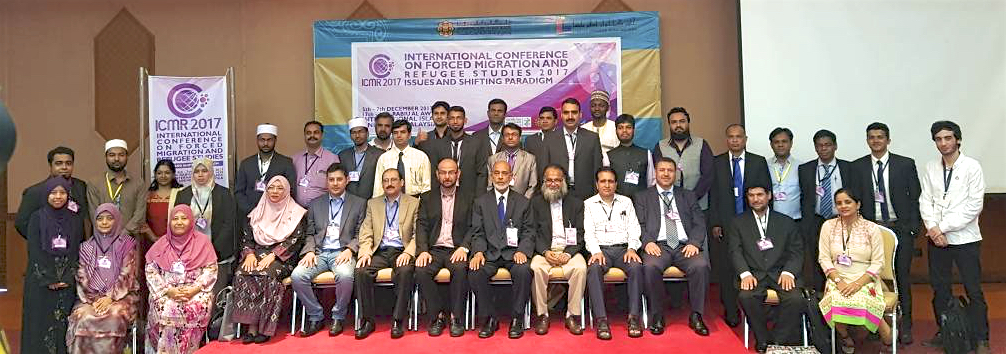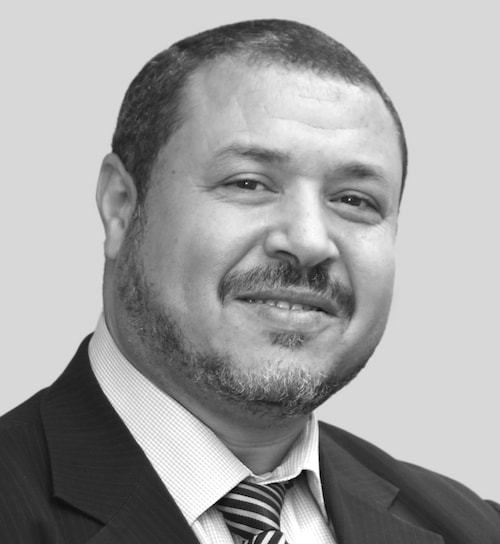
Dr Fethi B Jomaa Ahmed, CILE Research Coordinator, has participated in the International Conference on “Forced Migration and Refugee Studies: Issues and Shifting Paradigm” which was held in Kuala Lumpur, Malaysia on 5-7 December 2017. Dr Ahmed presented a research paper entitled “ Towards Sustainable Responses to Forced Migration” and moderated the session “Forced Migration and Theoretical Perspectives”.
In his presentation, Dr Ahmed discussed the undelivered justice of the global political and economic order. He pointed out that the international community neither prevented conflicts and wars nor succeeded to resolve them when they occur. Besides, the power of veto used by the five permanent members of the UN Security Council is hindering any resolutions to end conflicts. Moreover, the widespread of extreme poverty and hunger have enormous negative implications on forced migration.
The author critically analyzed the international community’s response to forced migration and pointed out that the UNHCR and OIC responses, for instance, were inadequate and unsustainable in many cases. Besides, both UNHCR and OIC lack focus on the root causes of forced migration and most of their efforts fall within the rubric of the humanitarian model rather than the development model.
[gallery order="DESC" ids="5379,5380,5381"]
Click to enlarge
The research paper has proposed some recommendations for the international community in general and UNHCR in particular to work on sustainable responses to forced migration. For instance, the international community needs to abolish the veto, fulfill its global moral responsibility, and consolidate its commitment to sustainable efforts that address the root causes of forced migration including the projects done by the UNDP, WB, OIC, EU, OECD and THP. Besides, the UNHCR shall review its governance, work philosophy, strategy and response method to meet the sustainable approach requirements. Moreover, UNHCR is strongly urged to apply creative diplomacy in various areas particularly to convince all UN Member States to accede to the 1951 Convention and its 1967 Protocol, influence the top donors, who provide funds for UNHCR projects, to implement zero earmarked funding policy. It is also very important to resolve protracted refugee cases who have been living in refugee camps for decades. These refugee camps such the Dadaab Camp in Kenya were initially built as temporary shelter. Furthermore, the UNHCR shall use creative diplomacy to strengthen inter-agency cooperation and lobbying particularly within the UN such as with the UN Human Rights Commission and the UN Peace Building Commission and the UN Development Program.
The author concluded that sustainable responses to forced migration are deeply rooted in the core values which are largely recognized by the international community including justice, dignity, ethics, and effectiveness. However, the success in such a noble struggle depends heavily on the political will and commitment of the UN, UNHCR, EU, OIC, AU and the international community at large.

Dr Ahmed Fethi is a New Zealander who grew up in Tunisia and completed his education in sociology and Islamic Studies overseas. He completed his BA in 1992 majoring in Applied Sociology and Statistics, his MA in 1997 majoring in Islamic Studies and his PhD in 2003 specializing in Political Sociology. He also holds certificates in Small Business Management, Treaty of Waitangi, and Malaysian Language and Studies. Dr Ahmed speaks Arabic, English, French and Malay. He worked as an Assistant Professor at the International Islamic University in Malaysia, and as an International Student Advisor, a Consultant and Casual Lecturer at the University of Auckland in New Zealand. He also worked as an Academic Director with the Saudi Arabian Cultural Mission in New Zealand. As a volunteer, he led Al-Manar Organization, the Center for Education and Development, and was the producer and presenter of Noor English/Arabic Radio program in New Zealand. Dr Ahmed has been engaged in public speaking in New Zealand, Australia, Malaysia, Tunisia and Qatar. He delivered many specialized lectures and seminars and participated in several international conferences and workshops. His main research interests include contemporary issues in Sociology and Muslim societies, Applied Ethics, and Islamic Thought and Civilization and he has a number of publications to his name. Dr Ahmed believes that knowledge is power and ethics is paramount.














إضافة تعليق جديد